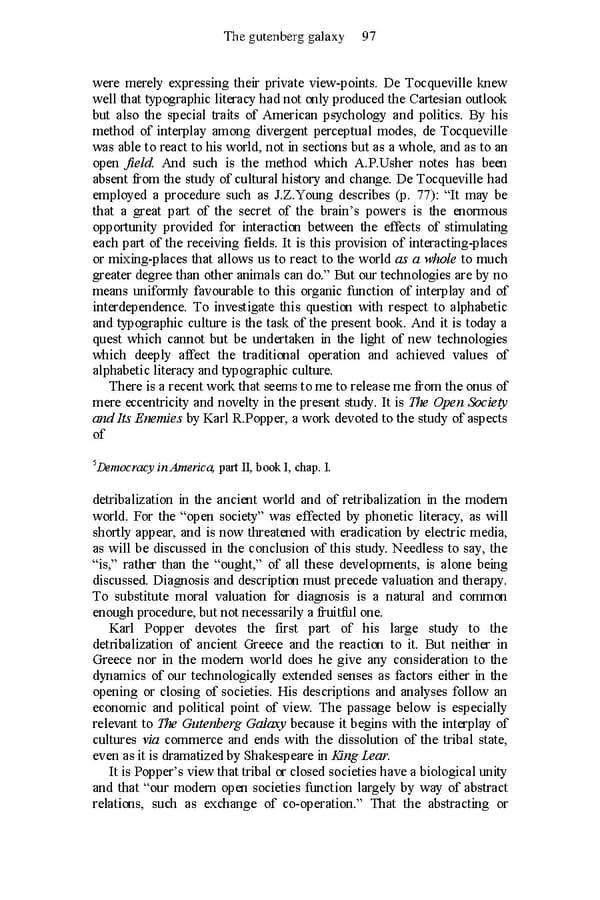The gutenberg galaxy 97 were merely expressing their private view-points. De Tocqueville knew well that typographic literacy had not only produced the Cartesian outlook but also the special traits of American psychology and politics. By his method of interplay among divergent perceptual modes, de Tocqueville was able to react to his world, not in sections but as a whole, and as to an open field. And such is the method which A.P.Usher notes has been absent from the study of cultural history and change. De Tocqueville had employed a procedure such as J.Z.Young describes (p. 77): “It may be that a great part of the secret of the brain’s powers is the enormous opportunity provided for interaction between the effects of stimulating each part of the receiving fields. It is this provision of interacting-places or mixing-places that allows us to react to the world as a whole to much greater degree than other animals can do.” But our technologies are by no means uniformly favourable to this organic function of interplay and of interdependence. To investigate this question with respect to alphabetic and typographic culture is the task of the present book. And it is today a quest which cannot but be undertaken in the light of new technologies which deeply affect the traditional operation and achieved values of alphabetic literacy and typographic culture. There is a recent work that seems to me to release me from the onus of mere eccentricity and novelty in the present study. It is The Open Society and Its Enemies by Karl R.Popper, a work devoted to the study of aspects of 5 Democracy in America, part II, book I, chap. I. detribalization in the ancient world and of retribalization in the modern world. For the “open society” was effected by phonetic literacy, as will shortly appear, and is now threatened with eradication by electric media, as will be discussed in the conclusion of this study. Needless to say, the “is,” rather than the “ought,” of all these developments, is alone being discussed. Diagnosis and description must precede valuation and therapy. To substitute moral valuation for diagnosis is a natural and common enough procedure, but not necessarily a fruitful one. Karl Popper devotes the first part of his large study to the detribalization of ancient Greece and the reaction to it. But neither in Greece nor in the modern world does he give any consideration to the dynamics of our technologically extended senses as factors either in the opening or closing of societies. His descriptions and analyses follow an economic and political point of view. The passage below is especially relevant to The Gutenberg Galaxy because it begins with the interplay of cultures via commerce and ends with the dissolution of the tribal state, even as it is dramatized by Shakespeare in King Lear. It is Popper’s view that tribal or closed societies have a biological unity and that “our modern open societies function largely by way of abstract relations, such as exchange of co-operation.” That the abstracting or
 Essential McLuhan Page 103 Page 105
Essential McLuhan Page 103 Page 105